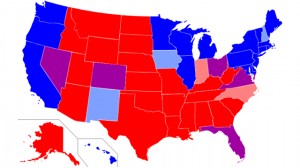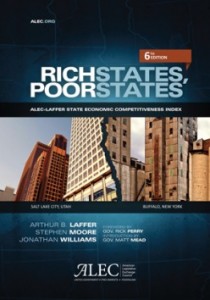
Map of red states and blue states in the United States. Credit: Wikicommons
Many local news outlets are touting the report as a concrete source for assessing their state’s economic performance. But it appears that ideology is what gets a state to the top — or the bottom — of the rankings.
Before we get to why that is, some background: ALEC — a self-proclaimed “nonpartisan” organization with an overwhelmingly Republican political membership — is where corporations and politicians can meet each other away from the prying eyes of taxpayers and voters. Together, ALEC’s members draft model laws that promote a corporate, profit-driven agenda that simultaneously seeks to dismantle a state’s public services and workers’ rights. With this in mind, any “reports” that ALEC issues must be scrutinized with a magnifying glass, lest the conclusions drawn from its hand-picked data be taken as objective reporting.For example, it’s no surprise, given the nature of its model bills, that ALEC’s report favors states offering low taxes and minimal government regulation. Whether or not those things create a strong economic climate, they are certainly favored by corporations. And red states — surprise, surprise — greatly outrank their blue brethren: of the ten states on which ALEC bestowed the honor of greatest economic outlook, all but Virginia have a Republican governor and a Republican-controlled legislature. (The Virginia Senate is split equally among Democrats and Republicans.) Eight of the report’s lowest-ranking states are governed by Democrats.
Some in the press are eating all this up. A recent Louisiana headline reads: “State-By-State Economic Report Shows a Lackluster Louisiana,” followed by an article that treats the state’s economic ranking as emanating from a disinterested authority. (Louisiana came in at #28 on ALEC’s list — the first time it hasn’t placed in the top 25.) North Dakota’s Jamestown Sun, claiming that “the assessment of North Dakota’s business friendly economy is being made again and again by independent out-of-state analysts,” cites ALEC as offering the latest of these “independent” analyses. Maryland’s WUSA9 essentially endorses “Rich States, Poor States” in a short “Your Money” report, pointing to ALEC’s recent “bad report card for Maryland – especially for your tax credit.” And then there’s Utah’s Deseret News, which exclusively interviews supporters of “Rich States, Poor States” – without once mentioning any of the report’s very vocal critics. (Utah, remember, is number one.)

Dr. Arthur Laffer, Economist and professor at University of Southern California, with "Laffer Curve" on blackboard, Feb. 23, 1981. (AP Photo)
“Grading Places” goes on to disparage using population growth, tax cuts, and anti-union “right to work” laws as measures for a state’s economic outlook. Despite the ALEC-Laffer report’s “aggressive claims,” Fisher and LeRoy say that the document still “fails to predict job creation, GDP growth, state and local revenue growth or rising personal incomes. Empirical evidence does not support its claims that estate taxes or graduated personal income taxes cause rich people to move and thereby retard economic development.” Their report goes on to illustrate that small negative correlations sometimes exist between ALEC-endorsed economic policies and a state’s positive economic outcome.

Protestors to Wisconsin Gov. Scott Walker's proposal to eliminate collective bargaining rights for many state workers listen in the rotunda at the State Capitol in Madison, Wis., in 2011, to testimony. (AP Photo/Andy Manis)
In the coming year, it wouldn’t be surprising if certain legislators attempted to pass off the “Rich States, Poor States” document as sound evidence in favor of changing their state’s economic policies. But citizens might do well to beware: as Greg LeRoy recently pointed out: “The real agenda is a policy or political agenda. It’s about trying to get states to lower taxes.”
 |
Laura Macomber is an associate producer at Okapi Productions. She is a former employee of Newsweek & The Daily Beast, where she produced news stories for the company’s live journalism events, Women in the World and The Hero Summit. |


